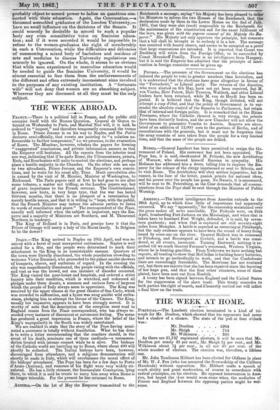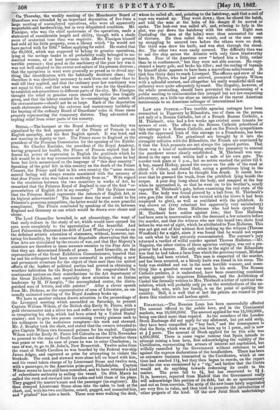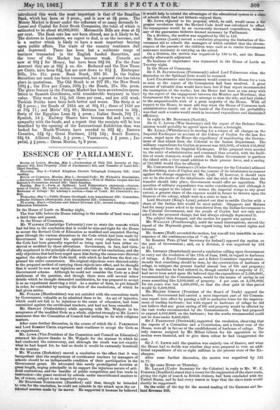THE WEEK AT HOME.
POLITICAL.—The Lambeth election terminated in a kind of tri- umph for Mr. Doulton, which showed that his opponents had never had a shadow of a chance. The state of the poll at four o'clock was :
Mr. Doulton . . . . 5264 Mr. Sleigh . . . . 754 Mr. Wilkinson . . . . 336
As there are 21,737 registered electors, it will be seen that Mr. Doulton got nearly 25 per cent., Mr. Sleigh 31 per cent., and Mr. Wilkinson about 14 per cent., in all not 30 per cent. of the whole number of electors. The election was, therefore, a lifeless one.
Mr. John Tomlinson Hibbert has been elected for Oldham in place of Mr. W. J. Fox (who has accepted the Stewardship of the Chiltern Hundreds) without opposition. Hr. Hibbert made a speech of much ability and great moderation, of course in accordance with radical principles, on his election. He opposed intervention in Ame- rica, but hoped the time would soon come when the mediation of France and England between the opposing parties might be wel- come. Somers—The banquet at the Royal Academy on Saturday was signalized by the first appearance of the Prince of Prussia in an English assembly, and his first English speech. It was brief, and not wanting in dignity or tact. The Prince came to England as the president of the Prussian Commission for the opening of the Exhibi- tion. Sir Charles Eastlake, the president of the Royal Academy, having proposed his health, the Prince of Prussia replied that he feared his power of expressing in English the gratitude which he felt would be in no way commensurate with the feeling, since he had been but little accustomed to the language of "this dear country." Speaking of the grief felt in this country on the death of the Prince Consort, the Prince said that in his own country the "same monu- mental feeling will always remain associated with the memory of that-dear Prince who was taken so suddenly from us." With regard to the emulation between the two countries in works of Art, he remarked that the Princess Royal of England is one of the first "re- presentatives of English Art in my country." Did the Prince mean that the Princess Royal represents the interests of English Art, or its highest achievements ? The former does the most credit to the Princess's generous sympathies, the latter would be the more graceful compliment. The Prince concluded by speaking of the tie between England and Germany as one which would be drawn ever closer and closer.
The Lord Chancellor bewailed, in apt phraseology, the want of that early culture in the study of art, which would have opened his eyes more completely to the appreciation of the beautiful. And Lord Palmerston illustrated the drift of Lord Westbury's remarks on the deficient artistic education of statesmen, without, however, imi- tating his humility, by the somewhat disputable observation that the Fine Arts are stimulated by the events of war, and that Her Majesty's ministers are therefore in some measure enemies to the Fine Arts in that they are determined friends of peace. Lord Granville, as the representative of the Great Exhibition Commissioners, boasted that he and his colleagues had been more successful in providing a new and permanent structure for the object of their care than the united efforts of the leaders of political parties had proved in obtaining a worthier habitation for the Royal Academy. He congratulated the continental nations on their contributions to the Art department of the Great Exhibition, and especially drew attention to an Italian landscape by M. D'Azeglio, " the accomplished orator, the distin-
guished man of letters, and able painter.' After a clever speech from Mr. Dickens, as the representative of men of Literature, an un- usually animated meeting of the Royal Academy broke up. On Thursday, the weekly meeting of the Manchester Board of Guardians was attended by an important deputation of five from a large meeting of unemployed operatives, who were all apparently respectable and hardworking, but in very dilapidated condition. Mr. Finnigan; who was the chief spokesman of the operatives, made a statement of considerable length and ability, though with a shade more of oratorical tone than was requisite. Mr. Finnigan himself had sold all his little property, even a library which "he would not have parted with for 1001." before applying for relief. He stated that the 80,0001., which was supposed to belong to genuine operatives, lying at the savings banks in all probability really belonged to un- married women, or at least persons little affected by the present terrible pressure ; that good as the machinery of the poor law was it was not well adapted to the extent and nature of the present distress ; that the operatives in want were generally so proud as to dread any- thing like identification with the habitually destitute class ; that therefore it was absolutely necessary to seek them out rather than to wait till they applied, and that the ordinary poor law machinery was not equal to this; and that what was wanted was for the Guardians to establish sub-committees in different parts of the city. Mr. Finnigan thought the relief in genuine cases should be rather less frugally given, and that the labour exacted for it—considering the nature of the circumstances—should not be so large. Each of the deputation made statements showing the extreme and unnecessary hardship of the bearing of the ordinary Board of Guardians' rules in those cases properly representing the temporary distress. They advocated ac- cepting relief from other parts of the country.
We have in another column drawn attention to the proceedings of the Liverpool meeting which assembled on Saturday, to present Captain William Wilson, of the British ship Emily St. Pierre, with a gold chronometer and a silver tea and coffee service for his gallantry in recapturing his ship, which had been seized by a United States' cruiser; and to give two purses containing twenty guineas each to his colleagues in the audacious recapture—his cook and steward. Mr. J. Beasley took the chair, and stated that the owners intended to give Captain Wilson two thousand guineas for his exploit. Captain Wilson said the Emily St. Pierre left Calcutta on the 27th November to proceed to the coast of South Carolina and discover whether there was peace or war. In case of peace he was to enter Charleston; in ease of war, to go to St. John's, New Brunswick. Twelve miles from the coast of South Carolina he was boarded by the Federal war-ship James Adger, and captured as prize for attempting to violate the blockade. The cook and steward were alone left on board with him, and his vessel taken charge of by Lieutenant Stone and twelve men, with a passenger, to the American prize-port, Philadelphia. Captain Wilson seems to have.still been consulted, and to have retained a kind of subordinate authority in sailing the vessel. On 20th March he called the cook and steward into his cabin and told them of his plans. They gagged the master's mate and the passenger (an engineer). He then decoyed Lieutenant Stone alone into the cabin to look at the chart, and, with his two auxiliaries, seized, gagged, and manacled him, and "pitched" him into a berth. Three men were walking the deck, whom he called aft, and, pointing to the hatchway, said that a coil of rope was wanted up. They went down ; then he closed the hatch, and told the man at the helm of his danger if he moved or spoke. The look-out was called aft, and, refusing to help in the plot, was put down the hatchway with the others. Eight men (including the man at the helm) were thus accounted for out of thirteen. He then called the watch, and as the men came up straggling he secured two before the others were on deck. The third man drew his knife, and was shot through the shoul- der. The other two were easily secured. The difficulty then was to sail the ship across the Atlantic with only three trustworthy hands. Four of the American crew " helped him a little, rather than be in confinement," but they were not able seamen. He expe- rienced a heavy gale, and broke his tiller; and the reefing of topsails by himself alone appears to have been a marvellous achievement. It took him thirty days to reach Liverpool. The officers and crew of the Emily St. Pierre, who had just arrived, presented Captain Wilson with a splendid sextant, and altogether his really wonderful skill and gallantry were quite adequately hymned. The illegality, however, of the whole proceeding, should have prevented the summoning. of a public meeting to testimonialize this intrepid but not law-respecting adventurer, as a little too close an imitation of the recent American testimonials to an American infringer of international law.
LAW AND JUSTICE.—Two terrible agrarian outrages have been committed in Tipperary by Ribandists, one of them on the person not only of a Roman Catholic, but of a French Roman Catholic, a M. Thiebault, who had a few weeks ago evicted some tenants for arrears of rent. The effect on the Roman Catholic priesthood of this outrage to a Roman Catholic, and on the French sympathizers with the oppressed Irish of this outrage to a Frenchman, has been strongly marked. The priesthood are brought by it into the strongest collision with the Ribandists, the French are convinced by it that the Irish peasants are not always the injured parties. That there was a kind of understanding among the peasantry to conceal the murderer seems clearly established. M. Thiebault was mur- dered in the open road, within half a mile of his own gate. The murder took place at 5 p.m., but no notice reached the police till 9. A. boy, napped Hickey, passed the corpse on the side of the road at about 6 o'clock, and stated that, seeing a gentleman lying in the ditch with his head down he thought him drunk. It seenis how- ever that he guessed the truth, from the pitchfork lying beside the corpse. A poor dog hung about the body, and snapped at the boy when he approached it, so that he went on to his brother's, nearly opposite M. Thiebault's gate, before examining the real state of the case. The body was found pierced by a ball from M. Thiebault's own gun (the iron of which was twisted with the blows it had been employed to give), as well as mutilated with the pitchfork. It was shown on (very reluctant but apparently very satisfactory) evidence, that the three Halloran who had been ejected by M. Thiebault bore malice against him; that Tom Halloran had been seen in conversation with the deceased a few minutes before the murder, and that the witness who saw this heard two shots fired before he was out of sight, which he attributed to Tom Halloran. This was not got out of him without first locking up the witness (Thomas Woodlock) for a night, since it was found that he would not repeat on oath what lie had privately communicated. The coroner's jury returned a verdict of wilful murder against Thomas Halloran.—Mr. Maguire, the other victim of these agrarian outrages, was not a pro- prietor but a farmer. His only crime in the sight of the Ribandists was that he had taken a farm from which the previous tenant, Michael Kennedy, had been evicted. This man is suspected of the murder, and has been arrested, as a bloody knife was found in his room. The body was stabbed and cut in the most horrible manner, and some- thing like a gunshot wound was seen in his neck. The Roman Catholic prelates, it is understood, have been concerting combined action against this iniquitous Ribandism, and the Archbishop of Cashel has formally written to Mrs. Thiebault a letter of spiritual con- solation, which will probably only jar on the wretchedness of the un- happy lady, who, with her family, is on the point of quitting the country. Still, it is well that at last the priests are roused to put down thin vindictive and lawless spirit.
Furerscres.—The Russian Loan has been successfully effected The amount offered to the public here, and in the Continental markets, was 10,000,0001. The amount applied for was 15,000,0001., being one-third more than requird. As the members of the London Stock Exchange did not apply for any allotment, but yet sold scrip, they have been compelled to "buy back," and the consequence is that the Scrip, which was at par, has been up to 1 prem., and is now
at prem. The amount of Stock applied for on this side was 4,600,0001. There is some vague rumour that Spain intends to attempt raising a loan here, first acknowledging the validity of the Certificates, representing the arrears of interest not capitalized, but wilfully cancelled by the Government without reference to and against the express declarations of the bondholders. There has been an extensive business transacted in the Certificates, which at one time had reached llf, but they then began to recede, on the report that the rise was occasioned by a " rig," and farther that the Cortes would not do anything towards redeeming its credit in the matter. The price fell to 8/, but has recovered to 811. It is, however, reported from Madrid that the Government really will acknowledge this portion of its debt, but do so spontaneously and not as from coercion. The scrip of the new loans lately negotiated are very firm in value, and thus tend to promote the introduction of other projects of the kind. Of the new Joint Stock undertakings
introduced this week the most important is that of the Brazilian Bank, which has been at 3 prem., and is now at 21 prem. The Money Market is firmer under the influence of so many demands fo Loans and Capital for Joint Stock Companies, the total of which is estimated to be about 40,000,0001. Mercantile Bills are done at 21 per cent. The Bank rate has not been altered, nor is it likely to be. The distress in Lancashire, we regret to find, is on the increase, and is a matter which is likely to have a most important bearing upon public affairs. The trade of the country continues dull and depressed. There has been but a moderate range of business transacted in the English funded Securities, and the tone of the Market has become weak. Consols are now at 931 for Money, but have been 931 94. For the June Account they are at 921 ex. div. Reduced and the New Three Bper Cents. have been 921, but are now down to 91f 1. Exchequer ills, 18s. 21s. prem. Bank Stock, 236 38. In the Italian Securities not much has been transacted, but a general rise has taken place in quotations. The Old Stock is at 227 29; the New Stock 1094 ; the Five per ',Cents, 1034 ; the Bonds, 27s. 30s. prem. The great feature in the Foreign Market has been an extensive specu- lation in Spanish Certificates, with considerable buoyancy in their value. They went to 11+, fell three per cent., and are still weak. Turkish Stocks have been both better and worse. The Scrip is at 213 prem.; the Bonds of 1854 are at 804 81; those of 1858 are at 70/ 71; and Mires' 671 68 ; Mexican has recovered to 321; Scrip of the Egyptian Loan 24 1 prem.; Italian Bonds, 701 71; Spanish, 54 1. Railway Shares have become flat and lower, in sympathy with the funds, and a report that the receipts will be less benefited by the opening of the International Exhibition than was looked for. North-Western have receded to 931 44; Eastern Counties, 574 81; Great Northern, 112: 131; South Eastern, 831 84. Alliance Bank, 5 1 prem.; Vancouvers, I I prem. ; Im- perial, 1 prem.: Ocean Marine, Si 9 prem.
































 Previous page
Previous page